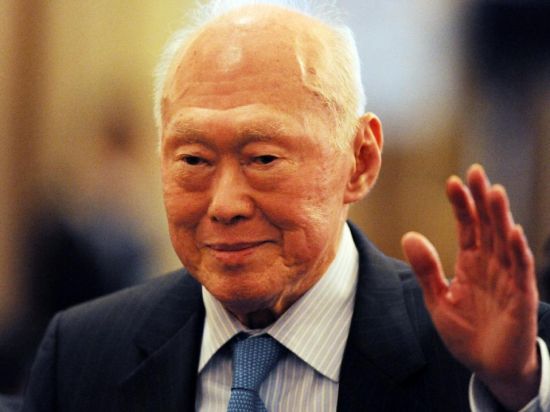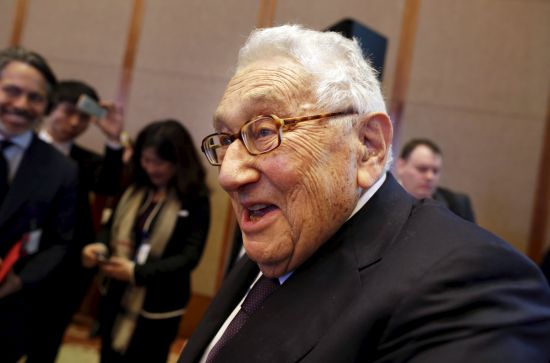李光耀在国内的执政方法与美国目前的宪法理论的观点不符,但即便是这样,说句公道话,托马斯-杰斐逊时代的民主就符合吗?在杰斐逊的时代,人们的选举权是有限的,投票要有满足财产条件,那时候还存在奴隶的问题。现在不是讨论是否有其它选项的时候。如果新加坡当时选择了批评者所说的道路,它可能因为种族問題而崩溃,就像是叙利亚向我們展示的局面那样。对于新加坡独立初期数十年至关重要的体系架构是否被无必要地延长了,则是另一个讨论的话题。
我在写悼词开始时提到我与李光耀的友谊,他不是能说许多动感情话的人。他几乎总是谈及实质性内容,但人们能够感受到他的情感牵托,与李光耀的对话是对支撑一个人目标感的信任投票。他将生命献给了公众服务,将大部分的时间用于共同探索。
李光耀生命的大悲剧是他深爱的妻子由于中风,失去了交流的能力。在妻子生病期间,李光耀每晚会坐在床边,为妻子阅读。他认为妻子能听懂他的话,尽管现实证据与此背道而驰。
Henry A. Kissinger was secretary of state from 1973 to 1977.
Lee Kuan Yew was a great man. And he was a close personal friend, a fact that I consider one of the great blessings of my life. A world needing to distill order from incipient chaos will miss his leadership.
Lee emerged onto the international stage as the founding father of the state of Singapore, then a city of about 1 million. He developed into a world statesman who acted as a kind of conscience to leaders around the globe.
Fate initially seemed not to have provided him a canvas on which to achieve more than modest local success. In the first phase of decolonization, Singapore emerged as a part of Malaya. It was cut loose because of tensions between Singapore’s largely Chinese population and the Malay majority and, above all, to teach the fractious city a lesson of dependency. Malaya undoubtedly expected that reality would cure Singapore of its independent spirit.
But great men become such through visions beyond material calculations. Lee defied conventional wisdom by opting for statehood. The choice reflected a deep faith in the virtues of his people. He asserted that a city located on a sandbar with nary an economic resource to draw upon, and whose major industry as a colonial naval base had disappeared, could nevertheless thrive and achieve international stature by building on its principal asset: the intelligence, industry and dedication of its people.
Lee Kuan Yew, the first prime minister of Singapore and co-founder of the People’s Action Party, has died at age 91. Lee led Singapore’s rise from British tropical outpost to global trade and financial center. (Reuters)
A great leader takes his or her society from where it is to where it has never been — indeed, where it as yet cannot imagine being. By insisting on quality education, by suppressing corruption and by basing governance on merit, Lee and his colleagues raised the annual per capita income of their population
from $500 at the time of independence in 1965 to roughly
$55,000 today. In a generation, Singapore became an international financial center, the leading intellectual metropolis of Southeast Asia, the location of the region’s major hospitals and a favored site for conferences on international affairs. It did so by adhering to an extraordinary pragmatism: by opening careers to the best talents and encouraging them to adopt the best practices from all over the world.
Superior performance was one component of that achievement. Superior leadership was even more important. As the decades went by, it was moving — and inspirational — to see Lee, in material terms the mayor of a medium-size city, bestride the international scene as a mentor of global strategic order. A visit by Lee to Washington was a kind of national event. A presidential conversation was nearly automatic; eminent members of the Cabinet and Congress would seek meetings. They did so not to hear of Singapore’s national problems; Lee rarely, if ever, lobbied policymakers for assistance. His theme was the indispensable U.S. contribution to the defense and growth of a peaceful world. His interlocutors attended not to be petitioned but to learn from one of the truly profound global thinkers of our time.
This process started for me when Lee visited Harvard in 1967 shortly after becoming prime minister of an independent Singapore. Lee began a meeting with the senior faculty of the School of Public Administration (now the Kennedy School) by inviting comments on the Vietnam War. The faculty, of which I was one dissenting member, was divided primarily on the question of whether President Lyndon Johnson was a war criminal or a psychopath. Lee responded, “You make me sick” — not because he embraced war in a personal sense but because the independence and prosperity of his country depended on the fortitude, unity and resolve of the United States. Singapore was not asking the United States to do something that Singapore would not undertake to the maximum of its ability. But U.S. leadership was needed to supplement and create a framework for order in the world.
Lee elaborated on these themes in the hundreds of encounters I had with him during international conferences, study groups, board meetings, face-to-face discussions and visits at each other’s homes over 45 years. He did not exhort; he was never emotional; he was not a Cold Warrior; he was a pilgrim in quest of world order and responsible leadership. He understood the relevance of China and its looming potential and often contributed to the enlightenment of the world on this subject. But in the end, he insisted that without the United States there could be no stability.
Lee’s domestic methods fell short of the prescriptions of current U.S. constitutional theory. But so, in fairness, did the democracy of Thomas Jefferson’s time, with its limited franchise, property qualifications for voting and slavery. This is not the occasion to debate what other options were available. Had Singapore chosen the road of its critics, it might well have collapsed among its ethnic groups, as the example of Syria teaches today. Whether the structures essential for the early decades of Singapore’s independent existence were unnecessarily prolonged can be the subject of another discussion.
I began this eulogy by mentioning my friendship with Lee. He was not a man of many sentimental words. And he nearly always spoke of substantive matters. But one could sense his attachment. A conversation with Lee, whose life was devoted to service and who spent so much of his time on joint explorations, was a vote of confidence that sustained one’s sense of purpose.
The great tragedy of Lee’s life was that his beloved wife was felled by a stroke that left her a prisoner in her body, unable to communicate or receive communication. Through all that time, Lee sat by her bedside in the evening reading to her. He had faith that she understood despite the evidence to the contrary.


